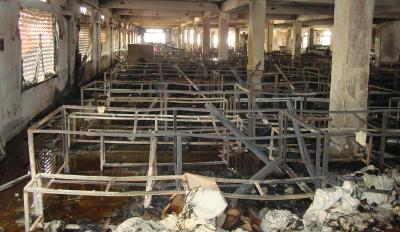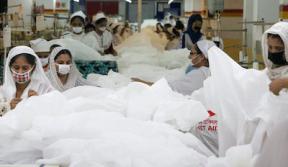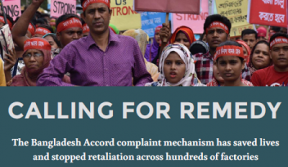
H&M is dramatically behind schedule in correcting the dangers faced by the Bangladeshi workers who produce its clothing, according to a report published today by the Clean Clothes Campaign (CCC), International Labor Rights Forum (ILRF), Maquila Solidarity Network (MSN), and Worker Rights Consortium (WRC).
The report, “Evaluation of H&M Compliance with Safety Action Plans for Strategic Suppliers in Bangladesh,” analyzes publicly available information regarding the level of progress H&M has achieved in addressing safety hazards in its factories in Bangladesh. The data is derived from factory inspection reports and Corrective Action Plans (CAPs) publicly disclosed by the Accord on Fire and Building Safety in Bangladesh (“Accord”). H&M signed the Accord in the wake of the 2013 Rana Plaza building collapse, which killed 1,138 workers, and was the deadliest disaster in the history of the global apparel industry.
The analysis shows that H&M has not honored its commitments to ensure the safety of the workers in Bangladesh who sew its clothes. Focusing on the subset of contract factories that H&M has deemed the best performers in its supply chain on labor and environmental issues, the report shows that all of these factories have failed to meet mandated timeframes for repairs and the majority of all renovations have still not been completed despite lapsed deadlines. The outstanding renovations include the installation of fireproof doors, the removal of locking or sliding doors from fire exits, and the enclosure of stairwells - meaning that in many factories workers may be unable to safely exit a factory in an emergency
In 2010, 21 workers died in a fire at H&M supplier factory Garib & Garib, which lacked critical safety elements, including proper fire exits.
“The Bangladeshi workers who sew H&M’s clothing continue to toil in extremely dangerous conditions, in many cases lacking the most urgent and lifesaving fire safety measures,” said Liana Foxvog of the International Labor Rights Forum.
“For the first time ever, thanks to the Accord, H&M now knows all the renovations needed to finally make its factories safe so that workers will no longer risk their lives and worry whether they’ll experience the next Rana Plaza,” said Bob Jeffcott of the Maquila Solidarity Network. “Despite this knowledge, they continue to drag their feet to carry out these critical renovations.”
“If only H&M was willing put the same energy into actually meeting their much lauded sustainability commitments as they do into promoting them, we may well be closer to seeing a safer garment industry in Bangladesh,” said Samantha Maher of the Clean Clothes Campaign.
“In the face of worldwide revulsion over the Rana Plaza catastrophe and other garment factory disasters, H&M, the largest producer of garments in Bangladesh, promised to address hazardous conditions in its contract factories there,” said Scott Nova of the Worker Rights Consortium. “It is now clear that H&M has broken this promise.”
Resources:
- “Evaluation of H&M Compliance with Safety Action Plans for Strategic Suppliers in Bangladesh”: http://laborrights.org/hmcapsreport
- Accord inspection reports and Corrective Action Plans: http://accord.fairfactories.org/ffcweb/Web/ManageSuppliers/InspectionReportsEnglish.aspx
Background on the Accord:
On April 24, 2013, the Rana Plaza building collapsed, killing 1,138 garment workers and injuring 2,500 more. It was the deadliest disaster in the history of the global apparel industry. In the wake of the tragedy, attention focused on the Western apparel brands and retailers sourcing from Bangladesh and the need for dramatic reforms in the way these companies address workplace safety in their overseas supply chains.
In an effort to address the fundamental issues that led to the Rana Plaza collapse and previous deadly industry disasters, an international coalition of labor rights advocates, including IndustriALL Global Union, UNI Global Union, Bangladeshi trade unions, and CCC, ILRF, MSN and WRC, helped form the Accord on Fire and Building Safety in Bangladesh, a legally-binding agreement in which signatory brands and retailers have committed to require their factories to undergo essential safety renovations and to provide financial assistance to factories that need it. As a result of public pressure, H&M, the single largest buyer from Bangladesh, became the first company to sign the Accord. To date, more than 200 companies have joined the program.

